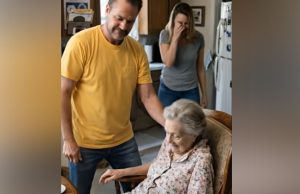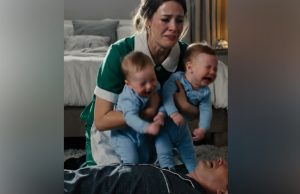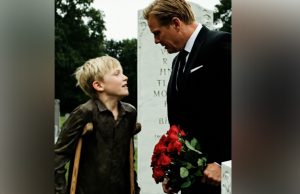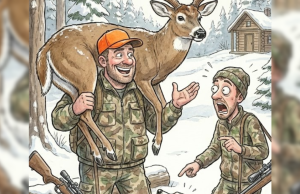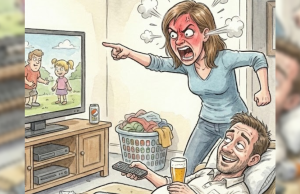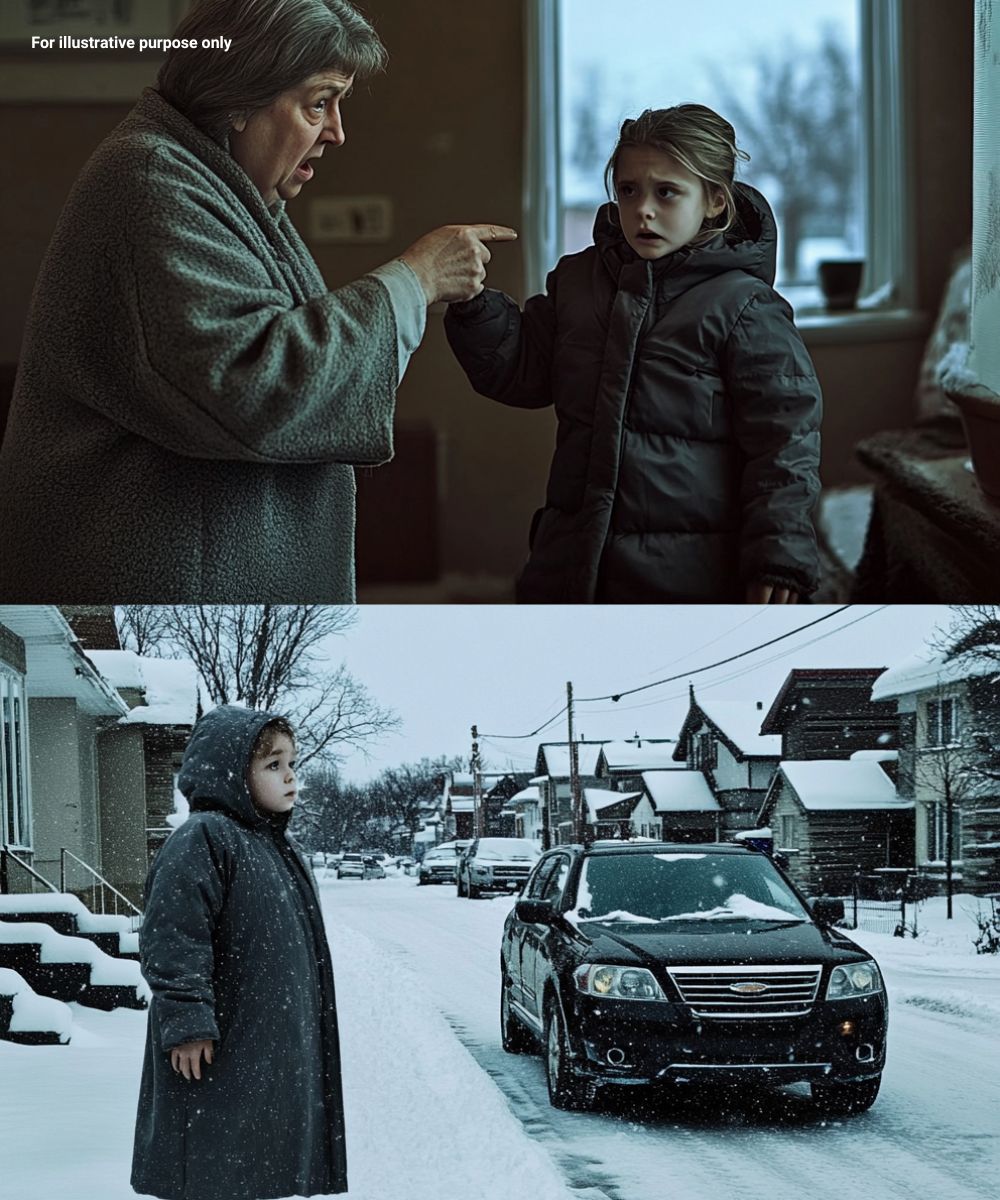
The gray sky hung low over the cemetery as the last handfuls of soil hit the coffin. Emily Carson, just ten years old, stood beside the grave, not crying like the adults expected. Instead, her eyes—wide and terrified—were fixed on the woman beside her. The one who used to smile at her when her father was around, but who now wore an expression as cold as the wind sweeping across the gravestones.
Melissa Greene, Emily’s stepmother, did not hold her hand. She didn’t offer comfort. The funeral had barely ended when Melissa turned and whispered, her voice sharp like ice, “Finish saying goodbye. You’re not staying here tonight.”
Emily’s heart sank. She didn’t understand.
They returned to the grand house that had once been filled with her father’s warmth. Without her dad, it felt cavernous, empty, and unfamiliar. As the door closed behind them, Melissa removed her gloves, tossed them on a chair, and faced the girl.
“This was never your home,” she said coldly. “You and your father were guests in my life. Now he’s gone.”
Emily stood frozen. “But… this is Daddy’s house.”

Melissa scoffed. “Not anymore.”
That night, without warning, Melissa handed Emily a plastic bag with a few clothes thrown in haphazardly. She shoved a worn-out coat into her hands and marched her toward the back door.
“You’re ten. You’ll manage,” she said.
Emily didn’t even have her school bag, her sketchbooks, or her favorite sweater. No warm boots. Just fear, confusion, and the cold. The garden was dark, and the only shelter she found was the wooden gazebo at the edge of the estate.
There, trembling, she curled up in a corner, clutching the worn leather notebook her father used to write in—his dreams, his hopes, some messages to her. It was all she had left. That night, the wind cut through the cracks of the gazebo, and snow began to fall lightly across the lawn. Emily shivered until she couldn’t feel her hands anymore.
At sunrise, the sound of car doors slamming startled her awake. Three people were walking toward the house: Grace Miller, her father’s longtime colleague and close friend; her husband, Mark; and another man she didn’t know well—David Walker, her dad’s former business partner.
As the front door opened and they stepped inside, Melissa greeted them with her usual faux charm.
“Grace, David, what a surprise.”
“We came to check on Emily,” Grace said. “We were all heartbroken by Jacob’s passing. We want to help however we can.”
“Emily?” Melissa blinked, too fast. “She’s… not here.”

Grace froze. “What do you mean?”
“She left with her aunt yesterday,” Melissa lied smoothly. “Didn’t want to stay.”
David narrowed his eyes. “What aunt? Jacob had no living siblings.”
The air thickened. Melissa’s expression faltered for a second. Mark stepped forward, voice stern. “Where is she, Melissa?”
Suddenly, from the garden, a faint cough echoed through the hall.
David and Grace rushed outside. There, in the gazebo, huddled under a frozen blanket, they found Emily—pale, lips blue, unable to speak.
“Oh my God,” Grace whispered, scooping her into her arms. “She’s freezing!”
Melissa appeared in the doorway. “I told her to wait inside. She must’ve run off.”
“You left her out here overnight?” David’s voice thundered. “Are you insane?!”
Emily weakly opened her eyes. “Daddy’s notebook… please.”
Grace held her close. “We’ve got you, sweetheart. You’re safe now.”
They drove Emily to a hospital. Doctors confirmed she had mild hypothermia but would recover. Grace stayed by her bedside all night. When Emily woke up fully, she whispered, “I didn’t know where to go. She told me to leave.”
Grace held her hand. “We’re going to fix this.”
Meanwhile, David contacted the family lawyer and demanded the reading of Jacob Carson’s will be expedited.
Three days later, the will was revealed: Jacob had left the majority of his estate—including the house, business shares, and trust fund—to Emily. Melissa was granted a small portion, with a clause: if she failed to provide proper care to Emily, all remaining assets would be withdrawn.
“She tried to throw her out the day he was buried,” Grace said angrily. “There’s your failure to provide care.”
Melissa’s face turned crimson. “She ran off!”

“No,” David growled. “You lied. And now you lose everything.”
Emily moved in with Grace and Mark Miller. Their home was smaller but filled with warmth. The first night, Emily hesitated before entering her new room.
“This… is mine?” she asked softly.
“Yes, darling,” Grace said. “And you can decorate it however you want.”
Mark added with a chuckle, “Just try not to paint the ceiling.”
Emily gave a small smile. It was the first one anyone had seen in days.
They made her hot cocoa. Let her pick the movie. Grace brushed her hair before bed. For the first time since the funeral, Emily slept without crying.
But Melissa wasn’t done.
She arrived at the Miller house one afternoon, crocodile tears in her eyes. “Emily, sweetheart, I’ve been so worried. I didn’t know where you went. You must’ve misunderstood me.”
Emily stood behind Grace, arms crossed. “I didn’t misunderstand. You told me to leave.”
“That’s not what I meant. I was grieving—your father’s death hit me hard.”
David stepped out of the kitchen. “Melissa, I suggest you leave. You’re trespassing.”
Melissa looked at Emily. “Come back with me. We can start over.”
Emily’s voice was clear and steady. “No.”
Melissa’s expression darkened, but she turned and left. Grace locked the door behind her.
David muttered, “We need to get full guardianship—fast.”
At the custody hearing, Grace testified. Doctors, nurses, even the gardener came forward—everyone had seen Melissa’s neglect or abuse. Emily also gave a quiet but powerful statement.
“She told me I didn’t belong. That I wasn’t her problem. My dad always said we were a team. But she kicked me out.”
The judge nodded slowly.
“Until full guardianship is decided, Emily will remain in the custody of Grace and Mark Miller,” he declared.

Melissa’s protest was cut short. “You abandoned her in the snow, Ms. Greene. You’re lucky criminal charges aren’t being pursued.”
Outside the courthouse, David put a hand on Emily’s shoulder. “One step at a time, kiddo. You’re doing great.”
Emily gave a soft nod.
“Thanks… for believing me.”
Emily Carson’s days began to feel normal again—at least, as normal as they could after everything she had endured. Living with Grace and Mark brought a sense of security she hadn’t felt in a long time. The gentle routine of breakfast at the table, quiet school drop-offs, and warm goodnights made her feel like a child again—not a burden, not a problem, just… Emily.
She still clutched her father’s notebook every night. She’d reread his words: “Whatever happens, Em, you are stronger than you know.” Those words became her anchor.
But peace didn’t last long.
One cloudy afternoon, Grace found a letter in the mailbox—no stamp, no return address.
“I demand access to my stepdaughter. You have no right to keep her from me. If you do not cooperate, I will be forced to take legal action. – M.G.”
Grace crumpled the note and dropped it in the trash.
“Still trying to play the mother card,” she muttered. “Unbelievable.”
Emily overheard.
“She wants me back?” she asked quietly.
Grace crouched beside her. “She wants control. Not you. And that’s a very different thing.”
Despite Melissa’s looming presence, Emily began thriving. She enrolled in a new school where her teachers praised her resilience. She made a friend named Lily and joined the school’s art club.
One afternoon, Mark peeked over her shoulder while she sketched in the living room.
“What’s that?” he asked.
“A fox and a girl,” Emily replied. “They’re running away from a shadow.”
“Looks like the fox is protecting her.”
Emily nodded. “He’s brave. But scared too.”
Mark smiled. “Sounds like someone I know.”
Meanwhile, David Walker and James Bennett (another of Jacob Carson’s former partners) worked behind the scenes. They secured a court-appointed counselor for Emily and gathered evidence proving Melissa’s financial and emotional abuse.
Melissa, desperate, hired a flashy lawyer who tried to argue that she had “acted out of grief.”
But David wasn’t having it.

“She left a grieving child in a frozen garden,” he said to the court. “That’s not grief. That’s cruelty.”
Emily had to testify again, and this time, she didn’t tremble.
“She doesn’t want me,” she told the judge. “She wants what my dad left behind.”
That single sentence shifted the tone of the courtroom.
Melissa’s legal team changed tactics. She began threatening Grace with phone calls and anonymous messages.
“You’ll regret this.”
“You can’t protect her forever.”
But Grace was unshaken. With David’s help, she filed for a restraining order and added security cameras to the house.
One night, after another court appearance, Emily asked, “Why won’t she just go away?”
Grace replied, “Because she doesn’t know what love is. She only knows control.”
Emily’s art became her therapy. She drew stories—some with dragons and magic, others with quiet forests and brave girls. Her art teacher submitted one of her comics to a local contest. A month later, she won first place.
Grace and Mark took her out for milkshakes to celebrate.
“I’m proud of you, Em,” Grace said, hugging her tightly. “You’re not just surviving. You’re blooming.”
Emily smiled. “I think Dad would be proud too.”
Mark chimed in. “I know he would.”
Melissa made one final desperate move. She claimed to have “new documents” proving Jacob had intended to leave her a greater share of the estate. She threatened to leak scandalous rumors if Grace and David didn’t settle out of court.
David met her in his office, calm but firm.
“You have nothing. You’re done here.”
Melissa leaned forward. “I still have rights.”
“No,” David said. “You had chances. And you burned every bridge.”
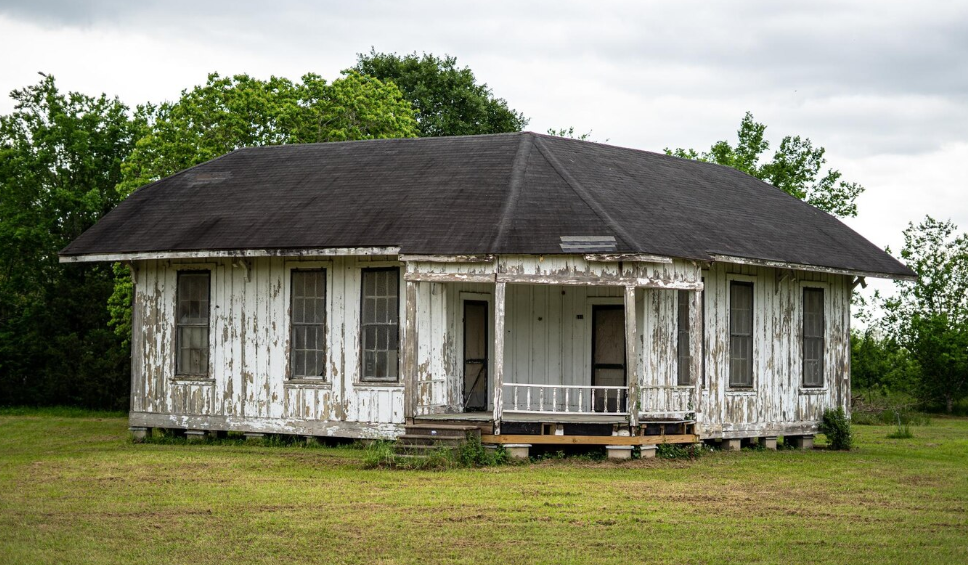
She stood abruptly. “You think you’ve won?”
He looked her in the eye. “I didn’t win. Emily did.”
To help Emily find closure, Grace arranged a supervised visit to her old house—to retrieve her belongings and say goodbye.
David and a court officer accompanied them. Melissa was legally required to stay away.
The house felt foreign to Emily now. The rooms were empty. The air, cold. But her old sketchbooks, a stuffed animal, and a few photo frames remained.
She walked through the halls quietly, then paused in her father’s study. His desk was dusty, but untouched.
She opened a drawer and found a letter addressed to her.
Written months before his d3ath.
“Emily, if you’re reading this, something has gone wrong. But I want you to remember: You were always my light. Never let the world make you small. Trust the good people. Draw your way out of the dark. I love you more than words can hold.”
Tears ran down her cheeks. Grace hugged her tight.
“That’s your real inheritance,” she whispered.
Back at home, the guardianship hearing neared. David prepped Grace and Mark, while Emily continued thriving.
The counselor reported that Emily’s emotional recovery was “remarkable given the trauma.” Teachers praised her curiosity and creativity. Her story even reached the local paper.
On the morning of the final hearing, Emily held Grace’s hand tightly.
“No matter what happens today,” she said, “I already feel safe.”
Grace smiled. “Let’s make it official.”
The courtroom buzzed with quiet tension. Emily sat between Grace and Mark, her small hand wrapped tightly around Grace’s. Across the aisle, Melissa Greene wore a carefully curated expression of sorrow and dignity—but the courtroom had heard enough.
The judge entered, shuffled some papers, and cleared his throat.
“In light of the extensive evidence provided, including medical documentation, testimony from the child and licensed professionals, and financial records,” he said, “the court hereby grants permanent guardianship of Emily Carson to Grace and Mark Miller.”
A quiet sob escaped Grace’s lips. Emily turned to her, stunned.

“It’s over?” she whispered.
Grace nodded, barely holding back tears. “It’s over, sweetheart. You’re safe.”
Melissa stood up, face pale. “This is unfair! She’s not even related to them!”
The judge slammed his gavel. “Ms. Greene, you will maintain no contact with the minor unless requested by the legal guardians. Continued interference will be considered a violation of court order.”
Melissa’s lawyer sat motionless, already defeated.
Outside the courthouse, reporters swarmed.
“Emily, how do you feel?” one called.
David stepped between her and the cameras. “No comments today. She’s just a child.”
But Emily, clutching her father’s notebook, looked up and said quietly, “I’m going home.”
Home now meant something different. The house with Grace and Mark was filled with life—photos on the walls, music from the kitchen, weekend barbecues with James and David dropping by. Emily even got her own desk in Grace’s office where she could draw freely.
One day, David visited with good news.
“We’ve finalized the trust account,” he said. “It’ll be held for her until she turns twenty-one. But any funds needed for her education, health, or art—fully accessible with your approval.”
“Thank you,” Grace said, glancing at Emily. “We’re making a little artist out of her.”
Emily blushed. “Maybe a big one.”
Emily threw herself into drawing. Her sketchbooks were filled with vivid images—characters based on her journey: a girl in a red hoodie escaping a mansion of ice, a fox made of stars protecting her from the dark.
Her art teacher noticed.
“She’s not just talented,” she told Grace. “She’s telling her story.”
Soon, Emily was selected to participate in a city-wide youth arts program. Her short comic—titled The Girl in the Snow—won second place. The story, wordless and haunting, depicted a small girl navigating a cold world with only a notebook and her imagination.
At the award ceremony, Mark whispered, “That’s our girl.”
Melissa, meanwhile, grew increasingly erratic. She gave interviews to trashy tabloids claiming the Carsons had manipulated her. One morning, David brought over a magazine.
“Widow Left With Nothing After Child Stolen”
“This would be funny,” he muttered, “if it weren’t so insulting.”
Grace threw it in the trash. “Let her scream into the void. We’re not answering.”
But Melissa wasn’t done.
She attempted to hack into Emily’s trust account using an outdated password she remembered from Jacob’s office. The attempt failed—and was flagged.
Within days, she received a legal warning from David and James: any further attempts to access funds would result in criminal charges.
That was the last they ever heard from her.
Months later, Emily surprised Grace.
“I want to go back to the cemetery,” she said one morning.
Grace hesitated. “Are you sure?”
“I want to talk to Dad,” Emily replied. “I’m ready.”
They went that afternoon. Emily wore her red hoodie and carried a new drawing—a picture of her, her dad, Grace, Mark, and even David and James—all smiling under a sunny sky.
She knelt by the stone and whispered, “Hi, Dad. I hope you’re proud. I’m okay now. I have people who love me. I still draw, like you told me to. I still have your notebook.”
She laid the drawing beside the grave. The wind lifted a corner and then let it fall gently into place.
Grace stood behind her, quiet.
“I think,” Emily said softly, “I’m not scared anymore.”
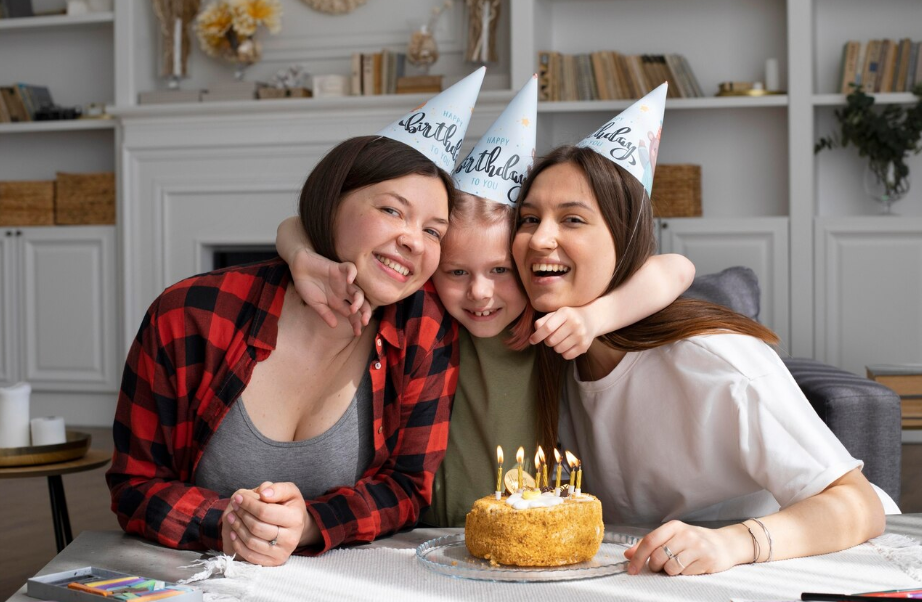
The next year was full of life: birthday parties, art camps, sleepovers with Lily, and even family trips to the countryside. Emily laughed more, cried less, and opened up about the pain she’d been through.
One night, Grace found a letter in her room—half-written in a sketchbook.
“Dear Melissa,”
I used to think you were a villain. Maybe you still are. But I also think you’re lost. I’m not angry anymore. I just feel sorry for you. I hope you find peace. I already have.”
Grace read it twice, then quietly closed the book. She didn’t say a word, but she hugged Emily extra tight that night.
When Emily turned 12, David arrived with a special surprise.
“I had this restored,” he said, handing her a wooden box.
Inside was her father’s old fountain pen, cleaned and working.
“I remember him using this at every meeting,” David said. “He always doodled when he was thinking.”
Emily stared at the pen, awestruck.
“Thank you,” she said. “I’m going to write my own stories with it.”
Emily’s teachers encouraged her to present her art at school assemblies. She gave a short speech during Arts Week.
“My name is Emily Carson. I love comics. I love stories. And for a while, I didn’t think I had a story worth telling. But now I know I do.”
She showed pages from The Girl in the Snow.
“It’s about being lost. And found. And believing that even when things are dark, you’re never truly alone.”
The applause lasted longer than she expected. Some of the teachers wiped tears from their eyes.
By the end of the school year, Emily was thriving. Her past no longer defined her—but it gave her a kind of quiet strength others could feel.
Grace sometimes caught her staring out the window, sketchbook in hand, deep in thought.
“What are you thinking?” she’d ask.
Emily would shrug. “Just… how far we’ve come.”
Years passed. Emily Carson grew into a thoughtful, creative young teen. At 15, she was already known in her school as the “girl who draws dreams.” Her artwork had won regional contests, and she was working on her first graphic novel—a story about a fox who guides a lost girl back to the light.
Life with Grace and Mark felt like second nature now. The house was filled with laughter, framed drawings, and the smell of Grace’s cinnamon cookies. David and James still visited often, treating Emily like a niece. The trust fund her father left remained untouched except for art supplies, school trips, and the occasional art workshop.
One afternoon, she sat in the garden with Grace, flipping through her father’s old notebook—the one she had held onto since that terrifying night in the gazebo.
“Do you ever feel like he’s still here?” Emily asked.
Grace smiled. “Every day. Especially when you talk about your stories.”
Emily closed the notebook. “I think I’m ready.”

“For what?”
“To really live my own life. To stop looking back.”
That fall, she gave a talk at her school titled “How to Begin Again.” She spoke honestly—about grief, betrayal, and being thrown out by someone who should’ve protected her.
“But I didn’t stay broken,” she said. “I found people who loved me, not because they had to—but because they chose to. And I learned to choose myself too.”
The room gave her a standing ovation.
That night, Emily wrote one final letter in her journal:
“Dad, I miss you. But I’m okay. I have a home. I have a voice. And I promise—I’ll spend the rest of my life telling stories that heal people the way you healed me. Thank you for believing in me even after you were gone.”
Emily looked out the window at the sky, now clear and endless.
Her story had started with loss—but it would go on with purpose, on her own terms.
She smiled, picked up her pen, and began to draw.




